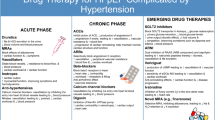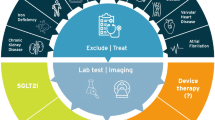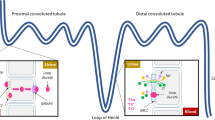Abstract
The Clinical Trials described in this article were presented at the Hotline and Clinical Trial Update Sessions of the European Society of Cardiology Congress held in September 2007 in Vienna, Austria. The sessions chosen for this article represent the scope of interest of Cardiovascular Drugs and Therapy. The presentations should be considered preliminary, as further analyses could alter the final publication of the results of these studies. PROSPECT evaluated echocardiographic criteria for optimal selection of patients with moderate to severe heart failure who may benefit from cardiac resynchronisation therapy, however concluded that no single echocardiographic measure can be recommended. EVEREST found that tolvaptan, a vasopressin V2 antagonist, resulted in early weight reduction and improvement of dyspnoea in patients with acute heart failure, but lacked long term improvement. In ARISE, the anti-oxidant succinobucal did not affect the primary outcome in high risk cardiovascular patients, but improved the combination of cardiovascular death, myocardial infarction and stroke, and diabetic control in diabetics. ALOFT showed that the addition of the renin inhibitor aliskiren to an ACE inhibitor or ARB and a beta-blocker leads to favourable effects on neurohormonal actions in heart failure. FINESSE markedly improved coronary patency before PCI with half-dose reteplase/abciximab in STEMI patients, however without significantly improving short-term outcome. The Prague-8 Study evaluated whether routine clopidogrel administered >6 h pre-angiography would be a safe way to achieve therapeutic drug levels in case a follow-up intervention would be considered immediately, but appeared not justified because of bleeding complications. CARESS in MI showed that high risk patients with evolving STEMI who undergo thrombolytic therapy should undergo PCI early after the thrombolysis. Finally, the ACUITY trial found that in moderate or high risk Non ST elevation ACS patients triaged to PCI, coronary artery bypass graft (CABG) surgery, or medical management, bivalirudin, with or without associated GPIIb/IIIa inhibitor therapy, resulted in a marked reduction of bleeding at 30 days whilst preserving the ischemic and mortality benefit at 1 year follow up.
Similar content being viewed by others
References
Yu CM, Abraham WT, Bax J, et al. Predictors of response to cardiac resynchronization therapy (PROSPECT)—study design. Am Heart J. 2005;149:600–5.
Gheorghiade M, Gattis WA, O’ Connor CM, et al. Effects of tolvaptan, a vasopressin antagoist, in patients hospitalised with worsening heart failure: a randomised controlled trial. JAMA. 2004;291:1963–71.
Udelson JE, McGrew FA, Flores E, et al. Multicenter, randomised, double-blind, placebo-controlled study on the effect of oral tolvaptan on left ventricular dilation and function in patients with heart failure and systolic dysfunction. J Am Coll Cardiol. 2007;49:2151–9.
Gheorghiade M, Orlandi C, Burnett JC, et al. Rationale and design of the multicenter, randomised, double-blind, placebo-controlled study to evaluate the efficacy of vasopressin antagonism in heart failure outcome study with tolvaptan (EVEREST). J Card Fail. 2005;11:260–9.
Konstam MA, Burnett JC, Gheorghiade M, et al. Effects of oral tolvaptan in patients hospitalised for worsening heart failure: the EVEREST outcome trial. JAMA. 2007;297:1319–31.
Gheorghiade M, Konstam MA, Burnett JC, et al. Short-term clinical effects of tolvaptan, an oral vasopressin antagonist, in patients hospitalised for heart failure. The EVEREST clinical status trial. JAMA. 2007;297:1332–43.
Serebruany VL, Malinin A, Eisert C, Ong S. AGI-1067, a novel vascular protectant, anti-inflammatory drug and mild antiplatelet agent for treatment of atherosclerosis. Expert Rev Cardiovasc Ther. 2007;5:635–41.
Ellis SG, Armstrong P, Betriu A, et al. Facilitated percutaneous coronary intervention versus primary percutaneous coronary intervention: design and rationale of the facilitated intervention with enhanced reperfusion speed to stop events (FINESSE) trial. Am Heart J. 2004;147:E16.
Gurbel PA, Bliden KP, Hiatt BL, et al. Clopidogrel for coronary stenting: response variability, drug resistance, and the effect of retreatment platelet reactivity. Circulation. 2003;107:2908–13.
Muller I, Besta F, Schulz C, et al. Prevalence of clopidogrel nonresponders among patients with stable angina pectoris scheduled for elective coronary stent placement. Thromb Haemost. 2003;89:783–7.
Bassand JP, Hamm CW, Ardissino D, et al. Guidelines for the diagnosis and treatment of non-ST-segment elevation acute coronary syndromes. The Task Force for the Diagnosis and Treatment of Non-ST-Segment Elevation Acute Coronary Syndromes of the European Society of Cardiology. Eur Heart J. 2007;28:1598–660.
Braunwald E, Antman EM, Beasley JW, et al. ACC/AHA 2002 guideline update for the management of patients with unstable angina and non-ST-segment elevation myocardial infarction-summary article: a report of the American College of Cardiology/American Heart Association task force on practice guidelines (Committee on the Management of Patients With Unstable Angina). J Am Coll Cardiol. 2002;40:1366–74.
Lincoff AM, Bittl JA, Harrington RA, et al. Bivalirudin and provisional glycoprotein IIb/IIIa blockade compared with heparin and planned glycoprotein IIb/IIIa blockade during percutaneous coronary intervention: REPLACE-2 randomized trial. JAMA. 2003;289:853–63.
Stone GW, Bertrand M, Colombo A, et al. Acute Catheterization and Urgent Intervention Triage strategY (ACUITY) trial: study design and rationale. Am Heart J. 2004;148:764–75.
Stone GW, McLaurin BT, Cox DA, et al. Bivalirudin for patients with acute coronary syndromes. N Engl J Med. 2006;355:2203–16.
Author information
Authors and Affiliations
Corresponding author
Rights and permissions
About this article
Cite this article
Recio-Mayoral, A., Kaski, JC., McMurray, J.J.V. et al. Clinical Trials Update from the European Society of Cardiology Congress in Vienna, 2007: PROSPECT, EVEREST, ARISE, ALOFT, FINESSE, Prague-8, CARESS in MI and ACUITY. Cardiovasc Drugs Ther 21, 459–465 (2007). https://doi.org/10.1007/s10557-007-6069-4
Published:
Issue Date:
DOI: https://doi.org/10.1007/s10557-007-6069-4




